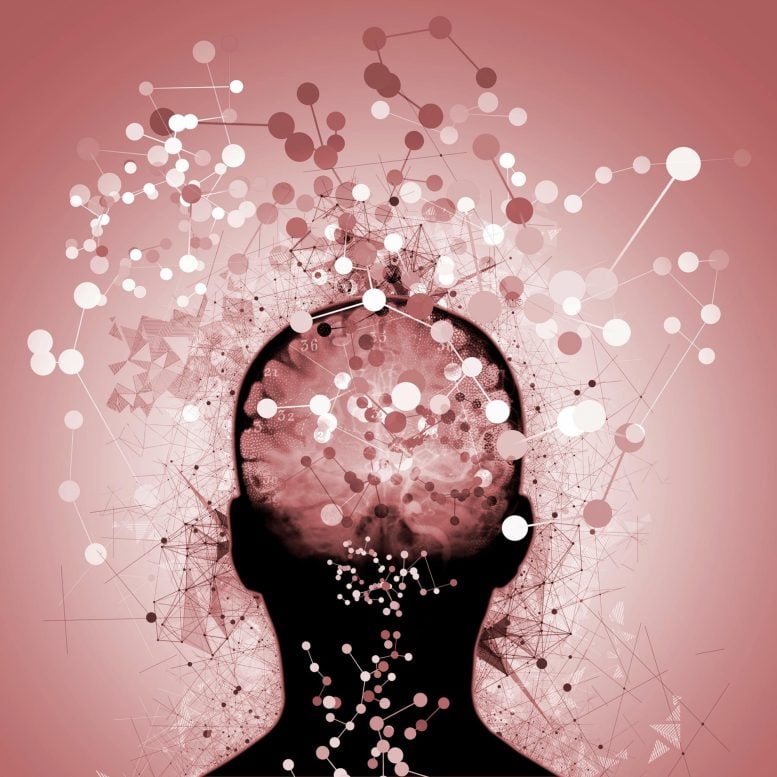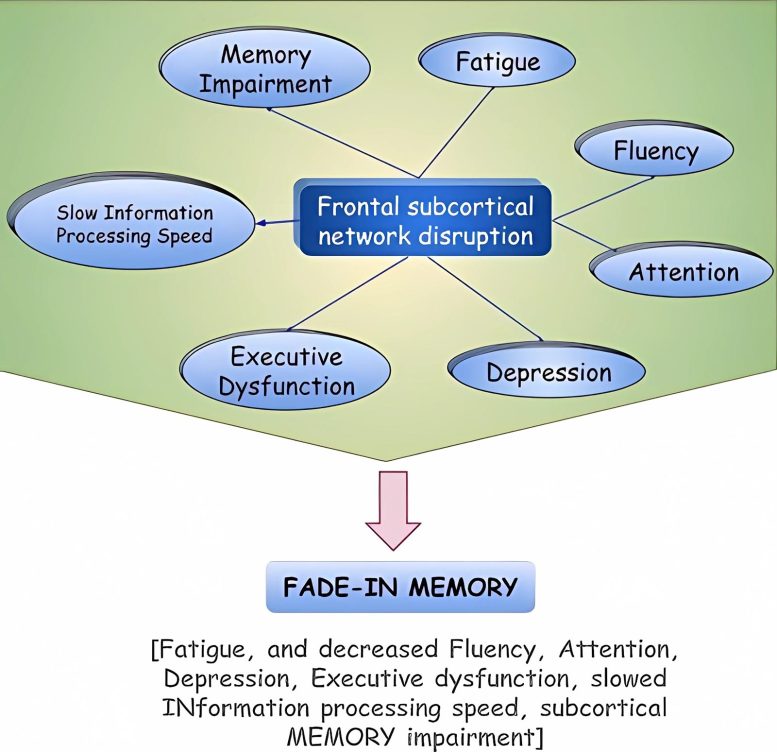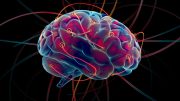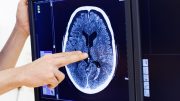
A study published in the Journal of Alzheimer’s Disease Reports reveals that infection with SARS-CoV-2 significantly impacts cognitive function in patients with preexisting dementia, causing rapidly progressive dementia. Researchers investigated 14 patients with various types of dementia and found that following COVID-19 infection, the differences between dementia subtypes became blurred, and cognitive deterioration progressed rapidly. Cortical atrophy and inflammation-related white matter intensity changes in the brain were observed, indicating that compromised brains have limited defense against new insults like infections or dysregulated immune responses.
All subtypes of dementia, irrespective of patients’ previous dementia types, behaved like rapidly progressive dementia following COVID-19, according to the Journal of Alzheimer’s Disease Reports
Infection with SARS-CoV-2 has a significant impact on cognitive function in patients with preexisting dementia, according to new research, published in the Journal of Alzheimer’s Disease Reports. Patients with all subtypes of dementia included in the study experienced rapidly progressive dementia following infection with SARS-CoV-2.
Since the first wave of COVID-19, neurologists have noticed both acute and long-term neurological syndromes and neuropsychiatric sequelae of this infectious disease. Insights into the impact of COVID-19 on human cognition has so far remained unclear, with neurologists referring to “brain fog.” A group of researchers driven to gain a better understanding of and dissipate this fog investigated the effects of COVID-19 on cognitive impairment in 14 patients with preexisting dementia (four with Alzheimer’s disease [AD], five with vascular dementia, three with Parkinson’s disease dementia, and two with the behavioral variant of frontotemporal dementia), who had suffered further cognitive deterioration following COVID-19.

“Brain fog” is an ambiguous terminology without specific attribution to the spectrum of post-COVID-19 cognitive sequelae. Based on the progression of cognitive deficits and the association with white matter intensity changes, the authors propose a new term: “FADE-IN MEMORY.” Credit: Journal of Alzheimer Disease Reports
Lead investigators Souvik Dubey, MD, DM, from the Department of Neuromedicine, Bangur Institute of Neurosciences (BIN), Kolkata, West Bengal, India, and Julián Benito-León, MD, PhD, from the Department of Neurology, University Hospital “12 de Octubre,” Madrid, Spain, explained: “We speculated there must have been some deleterious effect of COVID-19 in patients with preexisting dementia extrapolating our understanding from the cognitive impact of this viral infection in patients without dementia. However, post-COVID-19 evaluation of cognitive impairments in patients with preexisting dementia is difficult due to multiple confounders and biases.”
In addition to finding that all subtypes of dementia, irrespective of patients’ previous dementia types, behaved like rapidly progressive dementia following COVID-19, the team of investigators found that the line of demarcation between different types of dementia became remarkably blurry post-COVID-19.
Co-investigator Ritwik Ghosh, MD, Department of General Medicine, Burdwan Medical College and Hospital, Burdwan, West Bengal, India, expressed his concern about dementia subtyping. “It is more difficult in the post-COVID-19 era, where the history of this viral infection plays the most important role. Few patients with a history of COVID-19 without preexisting dementia have phenotypically and imaging-wise similar brain changes mimicking other degenerative and vascular dementias.”
Researchers also found that the characteristics of a particular type of dementia changed following COVID-19, and both degenerative and vascular dementias started behaving like mixed dementia both clinically and radiologically. A rapidly and aggressively deteriorating course was observed in patients having insidious onset, slowly progressive dementia, and who were previously cognitively stable.
Cortical atrophy was also evident in the study’s subsequent follow-ups. Coagulopathy involving small vessels and inflammation, which were further correlated with white matter intensity changes in the brain, was considered the most important pathogenetic indicator.
The rapid progression of dementia, the addition of further impairments/deterioration of cognitive abilities, and the increase or new appearance of white matter lesions suggest that previously compromised brains have little defense to withstand a new insult (i.e., a “second hit” like infection/dysregulated immune response and inflammation).
According to Dr. Souvik Dubey and his co-investigators, “’Brain fog’ is an ambiguous terminology without specific attribution to the spectrum of post-COVID-19 cognitive sequelae. Based on the progression of cognitive deficits and the association with white matter intensity changes, we propose a new term: ‘FADE-IN MEMORY’ (i.e., Fatigue, decreased Fluency, Attention deficit, Depression, Executive dysfunction, slowed INformation processing speed, and subcortical MEMORY impairment).”
Co-investigator Mahua Jana Dubey, MD, Department of Psychiatry, Berhampur Mental Hospital, Berhampur, West Bengal, India, added, “Amidst various psychosocial impacts of COVID-19, cognitive deficits, when accompanied by depression and/or apathy and fatigue in patients with or without preexisting dementia, require meticulous evaluation because it imposes added stress and burden on caregivers, one of the most important but often forgotten issues that may have the potential to hamper treatment.”
“As the aging population and dementia are increasing globally, we believe pattern recognition of COVID-19-associated cognitive deficits is urgently needed to distinguish between COVID-19-associated cognitive impairments per se and other types of dementia. This understanding will have a definitive impact on future dementia research,” Dr. Souvik Dubey concluded.
“Increasing epidemiological evidence of the association of COVID-19 and AD is the heightened risk of AD with COVID-19, and of increased COVID-19 in patients with AD points to shared pathogenesis. Dubey et al further clarify this connection in demonstrating COVID-19 fundamentally alters the course of dementia no matter the cause,” remarked George Perry, PhD, Editor-in-Chief, Journal of Alzheimer’s Disease, and Semmes Distinguished University Chair in Neurobiology at The University of Texas at San Antonio.
Reference: “The Effects of SARS-CoV-2 Infection on the Cognitive Functioning of Patients with Pre-Existing Dementia” by Souvik Dubey, Shambaditya Das, Ritwik Ghosh, Mahua Jana Dubey, Arka Prava Chakraborty, Dipayan Roy, Gautam Das, Ajitava Dutta, Arindam Santra, Samya Sengupta and Juliàn Benito-León, 14 February 2023, Journal of Alzheimer’s Disease Reports.
DOI: 10.3233/ADR-220090









Consider this study in tandem with “Unintended consequences of restrictive visitation policies during the COVID-19 pandemic: implications for hospitalized children”. Raphael, J.L., Kessel, W. & Patel, M.; Pediatr Res 89, 1333–1335 (2021). https://doi.org/10.1038/s41390-021-01439-0
The pandemic led to an interruptin in healthcare around the world. Hospitals especially in India were turning people away, and likely were not capable of caring for dementia patients at their previous level of care. Rapid decline in that case is not unexpected. If you can imagine feeling the confusion of a tenuous grasp on reality, then losing connection with family and friends and the healthcare assistance that maintains that grasp, over pandemic years…
Yeah, but. . . no mention of whether the subjects of this research had been jabbed or not. Yet surely this is relevant, as we know the mRNA injections are capable of crossing the blood brain barrier and potentially causing neurological damage (apart from turning you into a walking wireless transmitter/receiver!). Sounds like another of those studies designed to find what the funders were setting out to discover. It’s the spike protein, stupid, whether delivered via the virus or a shot in the arm (which the “experts” assured us stayed in the muscle tissue but now have been forced to admit migrates to a wide range of vulnerable organis. . . like the brain!
I know so many people who are now suffering from “issues”; heart, lungs, brain, nerves, etc. All have seen medical professionals, all are on some sort of medication / treatment yet not one has been asked to take, or given, a d-dimer blood test; why is that?
Spike proteins. Micro clots. Sure seems to be a good place to start.